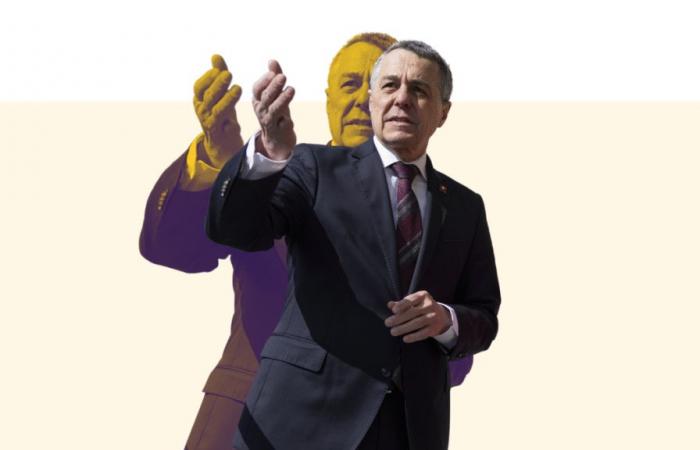The voice of the Minister of Foreign Affairs has tipped the scales.image: keystone, montage: watson
Analyse
The Minister of Foreign Affairs made a low profile for a long time. But today, Ignazio Cassis is fighting publicly for its bilateral agreements. Against his Keller-Sutter party colleague and the UDC, who has always supported him. Where does this new courage come from?
Stefan Bühler / CH Media
Those who know Karin Keller-Sutter do not doubt a second that she tried until the end of changing the Ignazio Cassis review. She even wrote a co -port against her PLR colleague’s project to the Federal Council. She considers that it is wrong to submit new agreements with the EU only to the popular majority, to the optional referendum. And that in particular in central and eastern Switzerland, skeptical on the question, it could be perceived as a cunning aimed at bypassing the will of the cantons.
Keller-Sutter wanted a mandatory referendum. She wanted a majority of cantons in addition to that of the people.
But Ignazio Cassis was not discouraged. Although nobody knows better than him what it means to be hated by the president of the Confederation. Her relations with Saint-Galleise were freezing, after her election in December 2018. She had to join the Department of Justice, when he could have prevented this.
On this sunny Wednesday in April 2025, Ticino took its courage in both hands and has established itself. Associated with those of the socialists Beat Jans and Elisabeth Baume-Schneider and the new representative of the center, Martin Pfister, his voice has tipped the balance in favor of the optional referendum. Against Keller-Sutter and against the two UDC Albert Rösti and Guy Parmelin. Their party had however always supported Cassis, in its election to the Federal Council in 2017 and during the general renewal elections of 2019 and 2023. On Wednesday, Ticino disappointed many allies.
The decision to launch the optional referendum opens up prospects, even if Parliament can still overthrow it. It clearly shows the importance that the government gives to the treaties. He does not want to take the risk of an absence of a majority of cantons. The Minister spoke in front of the media:
“The Federal Council is convinced that the continuation of the bilateral path is a strategic necessity for Switzerland. Bilaterals have proven themselves, serving Switzerland and its future ”
Ignazio helmet
Lack of commitment
Such determination on the part of Cassis is unusual. When he took over the Department of Foreign Affairs from his unfortunate predecessor, Didier Burkhalter, in 2017, Cassis announced a “reset” of European policy. At a press conference for his 100 -day balance sheet, he presented his strategy with colored polystyrene blocks symbolizing bilateral agreements.
They fell during the demonstration. And it is when he started that Cassis declared, with a view to negotiations with Brussels:
“If it works, it works. If it doesn’t work, it doesn’t work ”
An absence of barely hidden commitment. The president of the Socialist Party of the time, Christian Levrat, had then treated Cassis of “trainee”.
The Ticino minister then sent a high diplomat from his region, Roberto Balzaretti, on a mission in Brussels and on the media front. The Secretary of State negotiated the framework agreement and gave interviews. The Minister of Foreign Affairs remained behind, as if the file did not concern him.
No one asserted that Cassis actually sealed the negotiations by a handshake with European Commissioner Johannes Hahn in a Zurich hotel on November 23, 2023. What is certain is that in the end, it did not work. Under pressure from the parties of the Federal Council, the government sank the framework agreement in the spring of 2021. And Ignazio Cassis dropped his trusted man, Balzaretti.
Anyway, the Reset did take place – and after a certain time, the prospecting led by Livia Leu, then by the chief negotiator Patric Franzen, made it possible to start on new bases, which finally led to a positive conclusion of negotiations at the end of 2024.
The inheritance remains
Since then, Cassis, who had not wished to speak publicly for months, dares to go to the offensive. He declared, in March:
“Switzerland sits in the heart of Europe. We cannot change this ”
Already at the time, he spoke of the “strategic necessity” of agreements for the country, evoking the war of Russian aggression and uncertainty in the United States.
He is obviously convinced of the result of the discussions, which is much better than the project that failed. For example, with regard to the protection of wages or social works against abuse. The reset, as late as it is, was beneficial for blackcurrant.
In addition, the Minister of Foreign Affairs must now think about what we will remember. In all likelihood, he will retire at the end of the legislature. He no longer needs the support of the UDC to the Assembly. It can afford to bet fully on bilateral news. Whether it pleases his friends or not.
Without these agreements, what will be really of its action? The conference on Ukraine in Lugano in July 2022 and the Bürgenstock conference in 2024, which was certainly launched by the president of the Confederation, Viola Amherd. Without forgetting Switzerland’s support to the UN Security Council.
The federal advisor PLR wants to leave more. He risks to attract the wrath of his colleague, Karin Keller-Sutter.
(Translated and adapted by Valentine Zenker)






